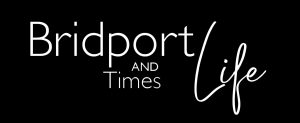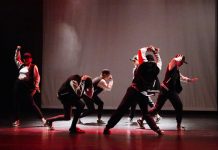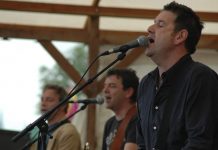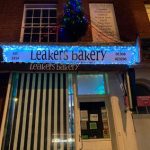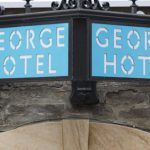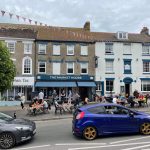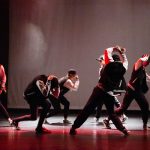‘I grew up in south London in the post-war years, with rationing, bomb sites and Teddy Boys. My dad was a fishmonger and when I was 10 years old I used to help him with his market stall. It was totally illegal. I used to go in on Saturday mornings and serve fish, weigh up frozen peas in little paper bags and tear up newspapers. I grew up with the work ethic – if you didn’t work you went hungry – which is something I’ve always been quite proud of.
My grandparents were immigrants from Russia and Poland so I always felt I was a bit different because I think I was the only one in my junior school that had grandparents that didn’t speak English very well. In retrospect, I rather enjoyed that but at the time I just thought it was quite funny because they just seemed to shout a lot to make themselves understood. Like my dad, they were hard workers and working has always been important to me. Imagine how they’d feel knowing our cousin is now The Lord Mayor of London, Ian Luder.
I was only the girl in my school to pass the 11+. It wasn’t until I was studying with the Open University and doing an education course that I saw it in black and white that during the era of the 50s and 60s, education authorities would fix the mark so that boys would pass with a lower mark to get a place. It made it all the more remarkable that I was the token girl. I loved it. It was an all-girls grammar school and at the time I wanted to be an academic. I enjoyed the whole thing of education but when I became 14 I just hated it, I couldn’t wait to leave. There was a lot of opposition from my parents and teachers. But I just worked it out in my head that I could leave at 15 if I took up an apprenticeship. So I went to a salon in Knightsbridge where I trained to be a hairdresser. I shampooed all day long, learnt everything then about sex and the very wealthy. Fifteen was quite young to go straight into London but it was a great three years. By the end of it, my parents had moved out of south London and went upmarket and had their own fish shops. By the time I was 17, it was too far out of London for me so I was wilful enough to leave home. My dad wouldn’t let me stay out to parties, he was very strict, quite rightly when you think of the dangers.
I was the older of two children. Because my dad was Jewish, my brother was the important one and automatically went into the business. But I was doing all right, I was ambitious. I met my first husband then and it was all part of the leaving home process, it was very impetuous. You couldn’t rent a flat together in those days because you weren’t allowed to have two different names on your tenancy. So you had to get married. It was an escape route and not uncommon for women of my era because there were so many doors closed to you. We rented a little flat in Hammersmith but if I wanted anything on credit for the home, I couldn’t buy it without my husband’s signature, even though I had my own income. I remember thinking that was terribly wrong.
You couldn’t have any form of birth control unless you had evidence you were getting married. When I was doing my apprenticeship, abortions were almost a daily occurrence. They cost twenty-five quid, which was a lot of money, and we used to have whip-rounds to help people out. We would take it in turns to go on the bus and keep them company. It’s terrible to think that backstreet abortions using a bit of water and a syringe and carbolic soap were the only answer.
I knew I wanted to have my own little hairdressing business. Between us, my husband and I saved up a thousand pounds. When my daughter Joanne was six months old I bought a hairdressing salon in Surrey. I loved that and took my daughter with me to work every day. She spent the first three years of her life amongst perm lotions, ammonia, hair all over the floor and she ate loads of it. I used to put her in her baby bouncer in the shop window overlooking the high street. She used to bounce and wave to the traffic.
My marriage broke down and then I met Mike who was a brilliant chef. We moved to Dorset to make a new start and I bought a salon in South Street, Bridport opposite the car park. I really wondered what I was doing here. It was weird, Surrey was upmarket and smart but false. The first night Mike gave me a fiver and said ‘go and get a bottle of wine and we’ll have a drink indoors’. South Street had all those pubs then from the Greyhound down to the Five Bells. I went into about four pubs and ended up at The Volunteer, which was opposite the salon. I remember seeing men drinking pints of cloudy cider and gobbing into the fireplace. Dot Brown was behind the bar and she gave me half a grimy bottle of gin from a cupboard under the stairs and I bought some Palmers tonics. It was brilliant, the best gin I’d ever had.
I loved the salon but after a couple of years Mike needed to cook again so he teamed up with Hamish Maxwell and they started a little firm called Westcountry Kitchen. The business started after all the landladies who used to come into the salon on Fridays found out he was a chef. They asked if he could cook them something for their menus. He started making fresh dishes in our little kitchen that they could heat up. It just got busier and busier. Hamish and Mike got together and rented a unit near Heavers. We were a busy couple and we went through the three-day week, random power cuts and appalling financial times. Inflation was at something like 25 percent and interest rates were 10 percent. Businesses in the main streets were dropping like nine-pins. We survived but only just. I was always scared of being poor. If you didn’t work you didn’t earn any money.
In the late 1970s we bought a little cottage in North Allington that had been renovated by Colin Crosby. By that time I was getting tired of hairdressing and fancied running a pub. We thought it was a good way of working and living together. We had our interview with Palmers and took over the Greyhound at Beaminster. I loved the licensees’ life but my daughter didn’t like it so much. She later told me she smelt like an ashtray for most of those four years we were running it. We did really well and got into the Michelin Guide. Lots of fun people came in including Anthony Blunt, Chris Chattaway, Robin Day and John Hurt.
We did not know it then but my husband had a congenital heart condition. He wasn’t very well and we were so busy with food he wanted a restaurant.
So we borrowed heavily and in 1982 left the pub and moved into Hogshill Street where we opened Nevitt’s Eating House. The week before we were due to open Mike had a massive heart attack. There we were with an unopened restaurant fully booked for Christmas and New Year with not a penny coming in. He was only about 43, which is terribly young. But he was strong enough to fight back and we opened up in the New Year but very slowly. We eventually built up to five nights a week but it was curtailed. If it had been now, his life would have been saved with the advancements that have been made in medicine. In the late 1980s he said he couldn’t do it anymore. I was anxious knowing he was just one heartbeat away from another heart attack. Fortunately, we sold just before the market crashed so we actually made money on the freehold. We came to live back in our cottage in about 1988 and he had three great years, not going to work. He used to paint up in the attic and cook. When he died in 1991 that was like the end of a whole era, we’d been married about 18 years. With my first husband, I made a lovely daughter but he was a bit of a lad. With my second husband I just forged my way business-wise, we were a good team. And then I met Dave and that’s just fun, going travelling together and socialising – avoiding stress and hard work. Mike died when he was 50, my daughter’s dad died at 50 and I had this horrible feeling they didn’t go beyond 50 so I watched Dave like a hawk.
Before my dad died he signed a property over to me and I converted it into flats, which I call working from home. In 2000 I saw an advert for a technology course with the Open University. In 2007 I gained a BSc degree. I have never had so much fun than working in online tutor groups. I loved it, building up web pages with people I’d never met. I thought it was wonderful, being able to study without leaving the house.
It gave me more confidence and I used study to escape from things. I’ve met lots of wonderful people with whom I’m still in contact.’

